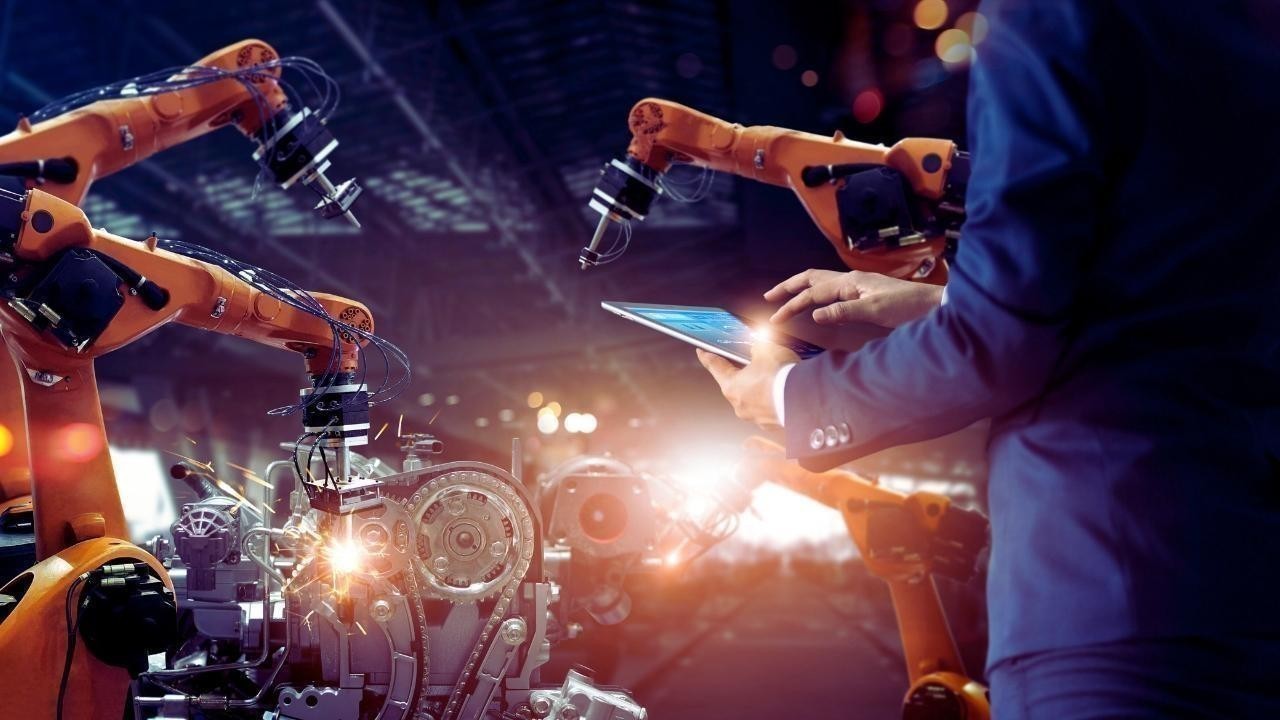
Post by : Anish
Hyperautomation is fast becoming the defining feature of modern enterprises. Unlike traditional automation that focuses on repetitive tasks, hyperautomation brings together artificial intelligence (AI), machine learning (ML), robotic process automation (RPA), and advanced analytics to create an interconnected web of smart, self-learning systems.
In 2025, companies across industries are increasingly adopting hyperautomation to enhance operational efficiency, improve accuracy, and reduce costs. From manufacturing plants to corporate offices, hyperautomation promises to eliminate manual workflows, improve speed, and provide real-time insights.
This shift is more than a technological upgrade—it represents a complete overhaul of how organizations function in the digital age.
Hyperautomation differs from simple automation in its depth and scope. It is not limited to automating repetitive processes but integrates multiple tools and technologies to continuously identify, assess, and automate business operations.
The process typically involves:
Intelligent automation through AI to manage complex decision-making.
Robotic process automation (RPA) to handle repetitive digital tasks.
Process mining and analytics to identify bottlenecks and inefficiencies.
Machine learning models that learn and improve over time.
Integration tools that enable seamless data exchange across platforms.
In 2025, hyperautomation platforms are increasingly powered by Generative AI, making them more adaptable, predictive, and proactive than ever before.
The global business landscape is undergoing rapid change, driven by digitization, rising labor costs, and market pressures to increase efficiency. Hyperautomation offers a comprehensive solution to these challenges, providing both operational savings and strategic agility.
Cost Efficiency: Reduction in labor and operational costs by automating both simple and complex tasks.
Increased Productivity: Employees are freed from routine tasks and can focus on creative, strategic roles.
Enhanced Accuracy: Elimination of human errors in routine processes.
Agility and Scalability: Faster adaptation to market changes through automated scaling.
Real-Time Analytics: Actionable insights through automated data gathering and AI-driven analysis.
Compliance and Risk Management: Automated monitoring and compliance tracking reduce regulatory risks.
A recent Deloitte survey revealed that 78% of large enterprises are accelerating hyperautomation initiatives in 2025, primarily to navigate market volatility and optimize internal operations.
While hyperautomation is impacting virtually every industry, certain sectors are witnessing faster adoption and transformative results.
Hyperautomation in manufacturing combines AI-powered predictive maintenance, autonomous production lines, and real-time supply chain management. Factories are transitioning into “smart factories” where minimal human intervention is required for daily operations.
Financial institutions leverage hyperautomation for fraud detection, customer onboarding, loan processing, and compliance tracking. Hyperautomation reduces the processing time of customer requests from days to minutes.
Hospitals are integrating AI-driven diagnostic tools with automated administrative systems, reducing patient wait times and improving care delivery. Hyperautomation also plays a crucial role in managing medical records and billing systems.
From inventory management to personalized marketing, hyperautomation enables retailers to operate more efficiently while providing highly tailored customer experiences.
AI-powered route optimization, automated warehousing, and drone deliveries are all facets of hyperautomation transforming logistics into a faster, leaner sector.
One of the biggest drivers of hyperautomation’s rapid expansion in 2025 is Generative AI. This advanced form of AI allows machines to:
Create workflows automatically by analyzing large datasets.
Predict operational failures before they occur.
Design complex automation scripts without human coding.
Communicate with customers through AI chatbots that learn and evolve in real-time.
Generative AI reduces dependence on human programmers, allowing businesses to scale their automation efforts without adding IT complexity. Enterprises now utilize AI-powered assistants that suggest process improvements and deploy new automations on demand.
Despite its promise, hyperautomation is not without its challenges:
High Initial Costs: The upfront investment for deploying AI, RPA, and process mining tools can be significant.
Integration Complexities: Legacy systems in older enterprises can complicate full integration.
Workforce Resistance: Employees may resist automation due to fears of job displacement.
Data Security Risks: Increased automation often means more data processing, making robust cybersecurity essential.
Ethical Concerns: Bias in AI models and transparency in automated decision-making are growing concerns.
Successful hyperautomation requires not just technology adoption but a cultural shift, with training programs to reskill employees and organizational changes to embrace human-AI collaboration.
Several global corporations have reported massive gains through hyperautomation in 2025:
Siemens has cut production cycle times by 30% after automating critical supply chain processes.
HSBC Bank reduced its customer onboarding time from 5 days to 20 minutes using AI-driven document verification systems.
Amazon continues to lead in warehouse automation, deploying AI-powered robots for inventory sorting, reducing manual intervention by 40%.
Apollo Hospitals reported 15% improvement in patient care efficiency through AI diagnostics combined with automated administrative workflows.
These examples illustrate that early adopters of hyperautomation are gaining a significant competitive edge.
Industry experts predict that by 2028, hyperautomation will be standard practice across most mid-to-large enterprises. The focus will shift from task-based automation to end-to-end digital transformation, where AI not only executes tasks but also drives strategy.
AI-powered decision-making systems replacing traditional management models.
Hyperautomation-as-a-Service (HaaS) platforms making advanced automation accessible to smaller businesses.
Low-code/no-code automation tools empowering non-technical employees to design their own automation solutions.
Full integration of physical robotics into enterprise workflows, especially in logistics and manufacturing.
In 2025, hyperautomation is not just a technology trend—it is a business survival strategy. Companies that delay adoption risk falling behind competitors who gain speed, efficiency, and agility through AI-driven operations.
Yet, hyperautomation’s success depends on balanced implementation, combining technological innovation with human creativity, ensuring that while machines handle routine tasks, humans can focus on value-driven innovation.
As enterprises continue their digital evolution, hyperautomation stands at the forefront, promising a future of faster, smarter, and leaner business ecosystems.
This article is intended for informational purposes only. It does not constitute business, financial, or technical advice. Organizations are encouraged to consult industry experts before making strategic technology decisions.

Pakistan Beats Bangladesh to Reach Asia Cup Final
Pakistan edged Bangladesh by 11 runs in a thrilling Super Fours clash, setting up an Asia Cup final

Taiwan Flood Rescue Continues After Typhoon Ragasa
11 still missing in Hualien as Typhoon Ragasa leaves 14 dead and thick mud blocks rescue efforts in

SpaceX Launches 24 Starlink Satellites from California
SpaceX launches 24 more Starlink satellites from Vandenberg Space Force Base, expanding its constell

Sheikh Mohammed Hosts Dubai Leaders at Al Mudaif Majlis
Sheikh Mohammed bin Rashid meets Dubai dignitaries, investors, and officials, highlighting community

UN Adds 70 Firms to West Bank Settlement Blacklist
UN blacklists 70 companies for human rights ties to Israeli settlements, raising global attention on

Shadows of Truth: Elias New Book Inspires Hope
Elias launches “Shadows of Truth: A Life in Prison,” a powerful new book blending poetry, resilience

Wall Street Rises After Trump Announces Pharma Tariffs
US stocks rise as Trump unveils new tariffs on pharmaceuticals, furniture, and trucks, while global

Biggest Movies Releasing in 2025: Hollywood, Bollywood & Beyond
The year 2025 promises to be an exciting one for movie lovers worldwide. With blockbusters, sequels,

Best Vegetables to Control Blood Sugar & Manage Weight After 40
Discover the best vegetables for people over 40 to control blood sugar support weight management a

7 Best Low Calorie South Indian Foods for Healthy Weight Loss
Discover 7 low calorie South Indian foods like idli dosa and sambar that help weight loss while ke

Healthy Breakfast Ideas for Diabetes Delicious Meals to Control Blood Sugar
Delicious, healthy breakfast ideas for diabetes to keep blood sugar steady and boost energy every mo

Nutrition for Healthy Eyes Top Foods and Tips to Keep Your Vision Strong
Protect your eyes naturally with essential vitamins minerals and foods Simple tips to keep your visi

Best Educational Cartoons for Kids Fun & Interactive Learning for Young Minds
Discover the best educational cartoons for kids that make learning fun boost creativity and teach

7 Best Vegan Protein Sources for Daily Diet Healthy Plant Based Foods for Energy & Strength
Discover 7 vegan protein sources like lentils quinoa & tofu to boost energy build strength and suppo

Fashion and Neuroscience How Clothing Shapes the Brain Emotions and Confidence
Discover how fashion and neuroscience connect Learn how clothing colors and style influence mood